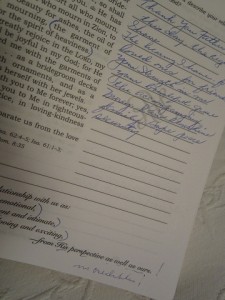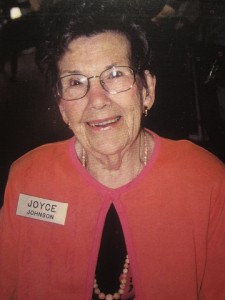Friday’s blog post quoted what a good mentor might say through letters my Aunt Joyce had sent to me. Your response was delightfully enthusiastic, and over the weekend something lovely happened when I met up with her children at a wedding in Washington State. These California cousins handed me a green leather book with Aunt Joyce’s name embossed on the front. “You’ll enjoy looking at this,” they said.
At first I didn’t recognize the book with its pretty gold edges, but inside I saw it was from me, inscribed to Aunt Joyce for her 88th birthday. It was a devotional journal, and after each day’s entry, there was space for her written reflections. Aunt Joyce had written down her thoughts and prayers, giving me a glimpse of how a good mentor talks to God.
During the 4 hour plane ride home tonight, I immersed myself in what she wrote and was impacted by her honesty before her Lord, wondering if you readers might be impacted, too. Below are quotes from this journal, plucked with care so as not to reveal her secrets but to show all of us how a godly woman sees herself in relation to God:
- Oh God, my trust is in you. I ask for deliverance from my feelings.
- Lord, order my conduct, and take my burdens.
- Remove my fear and anxiety. You said you would. I depend on that. Keep my mind stayed on Thee.
- Rejoice exceedingly, Joyce!
- God, if it’s not too late, I commit my cause to you. Help me do your way and will.
- “…that you may be blameless in the day of our Lord Jesus Christ.” Wow! Me?
- Lord, keep my attention on your side, not mine.
- Lord, I need to be motivated by your love. I ask this by your Spirit. Thank you, right now.
- Lord, open my eyes to see my enemy, which equals my captivity. Give me your equipment for fighting against captivity to sin. I want to conquer sin in my thoughts, attitudes, and actions.
- I feel like I’m going through your refiner’s fire to purify my wickedness. I’ve had anger, stress, and frustration when I should have had hope!
- Thank you for my Edward [husband of 62 years then]. I did not have sense enough myself to choose such quality.
- God’s grace is like a sandwich. The top of the bun is what I deserve from Him. The filling is God’s grace. The bottom is what I receive from Him… life eternal.
- I thank God for blessing received with no sorrow added.
- I need someone greater, wiser, stronger and more powerful than I am. In Him I have everything.
- Often God’s way up is down, but He’s there with us, too.
- I became a new being today, started all over – forgiven, cleansed, powered by Him through the Holy Spirit. Praise to the Almighty, over and over! I’m so grateful.
- To know Him is to love Him. I love you, Lord, and want to know you more.
- I’m starting to understand what grace is, and what my comfort can be.
- Stress and suffering shows me so clearly how very much I need Him, how hopeless and helpless I am without Him. I surrender all, dear Jesus, to you.
One of Aunt Joyce’s favorite verses, written out in her journal, is: “The Lord will perfect what concerns me.” (Psalm 138:8)





